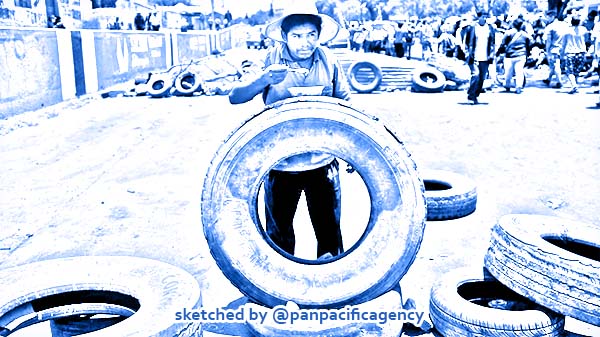Bolivian coup government seeks to prosecute ex-President Morales for terrorism over alleged call to block roads in protest

Bolivian protesters setting up a blockade © Reuters / Marco Bello. Sketched by the Pan Pacific Agency.
SUCRE, Nov 23, 2019, RT. Bolivia’s new government is prosecuting former President Evo Morales on terrorism and sedition charges, alleging the exiled leader, who fled to Mexico in fear for his life, is masterminding protesters’ blockades of the cities, Russia Today reported.
“We are seeking the maximum penalty for sedition and terrorism,” Interior Minister Arturo Murillo told reporters on Friday after filing the legal complaint against Morales with prosecutors. He accused the exiled president of pushing supporters to maintain roadblocks in order to keep food out of the cities, pointing to a recording allegedly found on a cell phone confiscated from a protester during security forces’ forceful dismantling of a roadblock outside Cochabamba.
On the recording, a man said to be Morales is heard advising a peasant leader to man the blockades in shifts and stating that he will attempt to return to Bolivia if the Congress rejects his resignation. Blockades outside Bolivia’s major cities – especially the capital of La Paz – have led to fuel and food shortages within, and the new right-wing government has not hesitated to use these to demonize Morales’ supporters – many (but not all) of whom are indigenous people living in the countryside. However, there is no indication that these blockades were Morales’ idea, or that they would vanish without his encouragement.
On Thursday, Bolivia’s Foreign Ministry filed a complaint with the government of Mexico, where Morales has political asylum, over the comments, claiming they “contravened” his political asylum. Morales hit back, calling the coup government’s prosecution efforts a “farce.” The estranged Bolivian president has called for the UN to intervene in the “massacre” of indigenous protesters, with over 30 already dead at the hands of security forces who have been exempted from criminal prosecution by an interim government eager to erase all traces of socialism from the country.
Because members of Morales’ MAS (Movement to Socialism) party, which have a two thirds majority in both the Senate and Chamber of Deputies, have been barred from legislative sessions, neither Morales’ resignation nor the self-declared presidency of opposition leader Jeanine Añez is technically legal. However, the congress must approve a new law to let elections move forward, and must approve new election supervisors after Morales’ victory was declared a fraud by the Organization of American States – even though another group that examined the vote found no evidence for that conclusion.
This has not stopped the new government from launching a crusade against all remnants of Morales’ government, threatening both members of MAS and journalists sympathetic to the party with arrest for “sedition.” Police attacked a funeral procession in La Paz with tear gas on Thursday, perhaps emboldened by the US’s unmitigated support for Bolivia’s “political transition.” If charged and convicted of terrorism and sedition, Morales would face up to 30 years in jail.